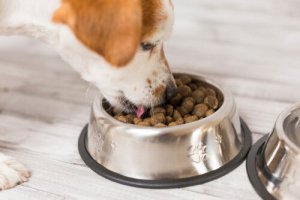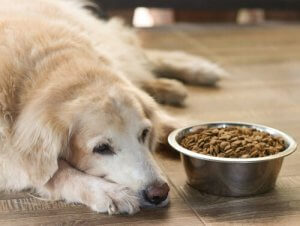Dietary Advice - Feeding Senior or Older Dogs

Our pets’ nutritional needs change depending on their species, age, size, and state of health. For example, senior or older dogs need different portion sizes and nutrient ratios to puppies.
The canine diet
Dogs are omnivorous animals. As well as hunting prey, their ancestor, the wolf, feeds on carrion, and even some types of plants and mushrooms. In the wild, wolves are able to eat large amounts of food in a short space of time whenever it becomes available. Their stomachs are built to withstand great strain, which is why dogs are able to eat one large meal a day.
Because they’re omnivores, dogs should ideally eat a varied diet, rather than one made up entirely of meat. Vegetables, legumes, fish, and fruit contain other nutrients which are just as important as those found in meat.
Depending on the age, breed, health, genetic predispositions, reproductive status, and activity levels of your pet, you may need to look for pet foods with different amounts of energy, protein, fiber, fat, and other nutrients.

The importance of the ingredients in pet food
When it comes to choosing the right pet food for your dog, there are a number of aspects you can look at to confirm the quality of the product. To do this, you’ll need to check out the ingredients:
- The order of ingredients. The ingredients are arranged from highest to lowest, with those at the beginning of the list being present in higher quantities than those at the end. The first thing on the list should be the source of protein (meat, fish, and legumes). Next, it should go on to list the carbohydrates, fats, vitamins and minerals.
- Specific is better than generic. It’s best to look for pet foods that list specific ingredients, like “chicken” or “lamb”, rather than generic terms such as “meat” or “poultry”.
- Essential nutrients. While animals require smaller quantities of these ingredients than other food-types, they’re still essential for good health. This includes fatty acids, vitamins and minerals. They can be found in a number of different foods, which is why it’s so important to look for pet foods with a variety of different ingredients.
- Ash. Ash is the term used to describe the residue left behind after the food is subjected to high temperatures during production. Supermarket pet foods generally contain higher quantities of ash. Because they contain more minerals, that can contribute to the build-up of plaque.
- Fiber. Fiber helps facilitate bowel movements. Moreover, it forces the dog to chew its food more carefully, helping to remove plaque from the teeth.
- Avoid foods that contain colorants and additives.

The nutritional requirements of senior or older dogs
As dogs get older, diseases that require a carefully controlled diet (such as colitis, hormonal and kidney diseases) become more common. Healthy older dogs, on the other hand, will mainly require lower calorie foods.
Older dogs have lower energy requirements. They store more fat, their metabolic activity and body temperature fall, and they generally become less physically active. Foods that contain 1500 or 2000 kcal/lb can help prevent obesity.
When it comes to nutrients:
- Older dogs require pet foods with 15-23% protein. Too much protein in the diet can affect the kidneys, so it’s important to keep it in moderation.
- Reduce fat content: pet foods designed for senior or older dogs should contain around 7-15% fat.
- Increase fiber: this will help to prevent problems such as constipation, and improve digestive health.
- Lowering the amount of phosphorus and sodium can help prevent kidney problems.
- Food designed for older dogs often contains additional nutrients to help their organs function properly, such as taurine (for the heart) or L-carnitine.
If an older dog is losing weight, experts recommend dividing its food into smaller portions and distributing them throughout the day to encourage it to eat. Similarly, you can help overweight dogs to stay active by using games or toys to encourage them to sniff out their food.
Dietary supplements can also be a good way to keep your dog in shape. However, this should always be discussed with a vet beforehand.
Our pets’ nutritional needs change depending on their species, age, size, and state of health. For example, senior or older dogs need different portion sizes and nutrient ratios to puppies.
The canine diet
Dogs are omnivorous animals. As well as hunting prey, their ancestor, the wolf, feeds on carrion, and even some types of plants and mushrooms. In the wild, wolves are able to eat large amounts of food in a short space of time whenever it becomes available. Their stomachs are built to withstand great strain, which is why dogs are able to eat one large meal a day.
Because they’re omnivores, dogs should ideally eat a varied diet, rather than one made up entirely of meat. Vegetables, legumes, fish, and fruit contain other nutrients which are just as important as those found in meat.
Depending on the age, breed, health, genetic predispositions, reproductive status, and activity levels of your pet, you may need to look for pet foods with different amounts of energy, protein, fiber, fat, and other nutrients.

The importance of the ingredients in pet food
When it comes to choosing the right pet food for your dog, there are a number of aspects you can look at to confirm the quality of the product. To do this, you’ll need to check out the ingredients:
- The order of ingredients. The ingredients are arranged from highest to lowest, with those at the beginning of the list being present in higher quantities than those at the end. The first thing on the list should be the source of protein (meat, fish, and legumes). Next, it should go on to list the carbohydrates, fats, vitamins and minerals.
- Specific is better than generic. It’s best to look for pet foods that list specific ingredients, like “chicken” or “lamb”, rather than generic terms such as “meat” or “poultry”.
- Essential nutrients. While animals require smaller quantities of these ingredients than other food-types, they’re still essential for good health. This includes fatty acids, vitamins and minerals. They can be found in a number of different foods, which is why it’s so important to look for pet foods with a variety of different ingredients.
- Ash. Ash is the term used to describe the residue left behind after the food is subjected to high temperatures during production. Supermarket pet foods generally contain higher quantities of ash. Because they contain more minerals, that can contribute to the build-up of plaque.
- Fiber. Fiber helps facilitate bowel movements. Moreover, it forces the dog to chew its food more carefully, helping to remove plaque from the teeth.
- Avoid foods that contain colorants and additives.

The nutritional requirements of senior or older dogs
As dogs get older, diseases that require a carefully controlled diet (such as colitis, hormonal and kidney diseases) become more common. Healthy older dogs, on the other hand, will mainly require lower calorie foods.
Older dogs have lower energy requirements. They store more fat, their metabolic activity and body temperature fall, and they generally become less physically active. Foods that contain 1500 or 2000 kcal/lb can help prevent obesity.
When it comes to nutrients:
- Older dogs require pet foods with 15-23% protein. Too much protein in the diet can affect the kidneys, so it’s important to keep it in moderation.
- Reduce fat content: pet foods designed for senior or older dogs should contain around 7-15% fat.
- Increase fiber: this will help to prevent problems such as constipation, and improve digestive health.
- Lowering the amount of phosphorus and sodium can help prevent kidney problems.
- Food designed for older dogs often contains additional nutrients to help their organs function properly, such as taurine (for the heart) or L-carnitine.
If an older dog is losing weight, experts recommend dividing its food into smaller portions and distributing them throughout the day to encourage it to eat. Similarly, you can help overweight dogs to stay active by using games or toys to encourage them to sniff out their food.
Dietary supplements can also be a good way to keep your dog in shape. However, this should always be discussed with a vet beforehand.
All cited sources were thoroughly reviewed by our team to ensure their quality, reliability, currency, and validity. The bibliography of this article was considered reliable and of academic or scientific accuracy.
- McDonald, Edwards Grennhalgh y Morgan. Nutrición animal.Zaragoza, Editorial Acribia, 1995.
- Hand, Tharcher, Remillard y Roudebush. Nutrición clínica en pequeños animales. Buenos Aires; Panamericana, 200.
- ATEUVES. Cómo valorar la calidad del pienso.
This text is provided for informational purposes only and does not replace consultation with a professional. If in doubt, consult your specialist.








